1 . The US Postal Service(USPS) is losing billions of dollars a year. The government company that delivers "small mail" is losing out to email and other types of electronic communication. First-class mail amount fell from a high point of 104 million pieces in 2000 to just 64 million pieces by 2014.
Congress permits the 600,000-employee USPS to hold a monopoly over first-class and standard mail. The company pays no federal, state or local taxes;pays no vehicle fees; and is free from many regulations on other businesses. Despite these advantages, the USPS has lost 52 billion since 2007, and will continue losing money without major reforms.
The problem is that Congress is preventing the USPS from reducing costs as its sales decline, and is blocking efforts to end Saturday service and close unneeded post office locations. USPS also has a costly union-dominated workforce that slows the introduction of new ideas or methods down. USPS workers earn significantly higher payment than comparable private-sector workers. The answer is to privatize the USPS and open postal markets to competition. With the rise of the Internet, the argument that mail is a natural monopoly that needs government protection is weaker than ever.
Other countries facing declining letter amounts have made reforms. Germany and the Netherlands privatized their national postal companies over a decade ago, and other European countries have followed suit. Britain floated shares of the Royal Mail on its stock exchange in 2013. Some countries, such as Sweden and New Zealand, have not privatized their national postal companies, but they have opened them up to competition.
These reforms have driven efficiency improvements in all of these countries. Additional number of workers have been reduced, productivity has risen and consumers have benefited. Also, note that cost-cutting measures — such as closing some post offices — are good for both the economy and the environment.
Privatization and competition also encourage new changes. When the USPS monopoly over "extremely urgent" mail was stopped in 1979, we saw an explosion in efficient overnight private delivery by firms such as FedEx.
The government needs to wake up to changing technology, study postal reforms abroad and let businessmen reinvent(彻底改造)our out-of-date postal system.
1. What does the underlined word "monopoly" in Paragraph 2 mean?| A.The act of solving a problem. |
| B.A duty to deal with something. |
| C.Complete control of a public service/goods. |
| D.The plan of investing money in something. |
| A.Its great competitor is the delivery firm FedEx. |
| B.It is an old public service open to competitions. |
| C.Its employees don't pay federal, state or local taxes. |
| D.It has complete control of first-class and standard mail. |
| A.explain the procedures of reform to the USPS |
| B.show the advantages of private postal services |
| C.set some examples for the government to learn from |
| D.prove the situation is very common around the world |
| A.needs government's protection as ever |
| B.can work together with other businesses |
| C.must be replaced by international companies |
| D.should be sold out and become a private service |
I: Introduction CP: Central point P: Point Sp: Sub-point C: Conclusion
A.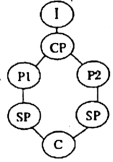 | B. | C.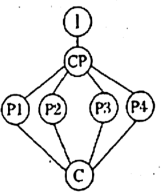 | D. |
2 . It’s common that a Japanese-American bows on the phone—but only in Japanese. Behaviors and manners can become so routine that they appear even when there’s no need for them. Those who are bilingual(双语的) and bicultural know first-hand that how we behave can depend on what language we are speaking. Scientists have shown that who you are in the moment can depend on the language you are using at that time.
This is because when you have an experience, the language you are using becomes associated with it. For bilingual people, this means certain memories are more closely associated with one language than the other—a phenomenon called “language-dependent memory”. For example, a childhood memory is more likely to be remembered when the language spoken during that childhood event is spoken again.
How we think and feel can thus change depending on what language we are using. For example, people who are bilingual have an intensified stress response when listening to the words of scolding in a native language. This may be, in part, because our early memories associated with learning a “bad” word or being scolded by our parents happened in our native language.
Because emotions play a key role in how we make decisions, people are often more sensible when making choices in the less emotional foreign language. Language can even influence our decisions. When asked whether they would be willing to give one person’s life to save a group, people who speak more than one language are much more likely to say “yes” when answering in a foreign language. The unpleasant feelings that can prevent us from making difficult choices are reduced when we’re using a non-native language.
The language we speak has an influence on how we think, feel, and even behave. In a way, knowing different languages can provide people with a variety of views through which to see the world.
1. Why is the example of the Japanese-American mentioned in Paragraph 1?| A.To show Japanese people are polite. |
| B.To show bowing is good manners. |
| C.To show culture affects a person greatly. |
| D.To show language affects a person’s behavior. |
| A.Memories are greatly influenced by a certain language. |
| B.A childhood memory can be recalled in a certain language. |
| C.A good memory can help you learn a language well. |
| D.A language can determine a person’s memory. |
| A.Obvious. | B.Abnormal. |
| C.Increased. | D.Limited. |
| A.When speaking a native language. |
| B.When speaking a foreign language. |
| C.When making a random choice. |
| D.When feeling very delighted. |
| A.Language determines your character |
| B.You are what you are speaking |
| C.A new language, a new self |
| D.More languages, better future |
3 . People who have got rhythm might have an advantage when it comes to language and reading skills. A new study shows the brains of people who can move to a musical beat react to speech on a more consistent basis than those who can't. Researchers also find that musical training can sharpen the brain’s response to language.
The researchers say their discovery provides the first biological link between the ability to keep a beat and how the brain responds to speech, something that can have important value for reading skills. To gather materials for their research, the team got more than 100 teenagers who lived in Chicago, Illinois. The teens were given two tests. First, they were instructed to listen to and tap their fingers along to the beat. The researchers calculated low accurately their young volunteers were able to tap along to the musical timekeeper. Second, the teen subjects were linked to an EEG device, which measures electrical activity in the brain. The EEG device was focused on an area of the brain that not only processes sound, but is also connected to parts of the brain responsible for motor-movement. The researchers recorded the brainwaves as their teen subjects listened to the synthesized speech sound, which was repeated irregularly for half an hour. The researchers were able to find out how the nerve cells in that particular region of the brain responded every time the synthesized sound was played.“Across this population of adolescents, the more accurate they were at tapping along to the beat, the more consistent their brains' response to the letter unit was,” said Nina Kraus.
While past studies have showed the links between reading skills and a person’s ability to keep a beat, the researchers said their new findings show the hearing system is what provides a common basis for those links. “Rhythm is naturally a part of music and language.” Nina said.
1. According to the first paragraph, what can get the brain’s reaction to language more effectively?| A.Rhythm. | B.Reading skills. |
| C.Language. | D.Musical training. |
| A.It shows how the brain works. |
| B.It is very important for reading ability. |
| C.It shows how the brain reacts to speech. |
| D.It is helpful to researchers' findings. |
| A.persons or animals that are studied in an experiment or a research |
| B.areas of knowledge studied in a school, college, and so on |
| C.things that are being discussed in a conversation or a book |
| D.persons or things that are the main features of works of art |
| A.reading skills may make language learners keep a beat |
| B.the hearing system may be useless while a person is learning to read |
| C.the hearing system may separate sound from meaning while a person is reading |
| D.the hearing system may be used while a person is reading or taking musical training |
| A.Moving to a musical beat is more popular. |
| B.Experts are expanding their studies on rhythm. |
| C.Rhythm might help us improve our reading skills. |
| D.Experts find the links between the hearing system and reading. |
4 . A Visitor Oyster card is the cheapest way to pay for a single adult journey in London. It's a plastic smartcard.You can use it on the bus, tube, tram, DL R. London Overground and most National Rail services. It's much cheaper than buying individual tickets, in some cases costing 50%less than the price of a regular paper ticket.
How to get a Visitor Oyster card
You can buy a Visitor Oyster card online.Your card will be delivered by post.The card costs £5 and you choose how much money you want to add to the card. This means you can start using the card the moment you arrive in Central London.
How does the Visitor Oyster card work?
The Oyster card works on a pay-as-you-go system.You start by adding money to the card. Then you travel, the cost of the fare will automatically be deducted from your Visitor Oyster card. For example, if you add £20 to the card and make a tube journey of£2.30, you will have £17.70 left on the card.
A few more points:
A child under the age of ll travels free when accompanied by an adult.
You'll save more money if you use the tube several times.The Visitor Oyster card is capped at £6.80 per day.
You'll pay more during peak times.Peak fares apply from Monday to Friday(6:30 am- 9:30 am;4:00 pm-7:00 pm).except for public holidays.
Reuse the Oyster card by adding credit at a tube station,Oyster ticket shop or Visitor Centre.
Receive a discount on the Thames Clippers River Bus services:
1. What can we learn about the Visitor Oyster card?| A.You can't use it during public holidays. |
| B.You can have it mailed directly to your home. |
| C.You can get a free Oyster card if you order online. |
| D.You can receive a 50%discount at any shop in London. |
| A.£2.30. | B.£3.40. |
| C.£6.80. | D.£9.20. |
| A.At a tube station. |
| B.At a bus station. |
| C.On the Internet |
| D.In convenience stores. |
| A.set an upper limit |
| B.meet a deadline |
| C.follow a principle |
| D.prohibit visiting |
But what killed Facebook for me was when I posted a photo, and five minutes later my son asked me how many “likes” it had got. His question was a wake-up call.
“Likes” are signs of acceptance and approval. I had forgotten that acceptance and approval need to come from within and had unknowingly set him a bad example.
Before absorbed in Facebook, I spent a lot more time reading books and magazines. I checked in with friends through texts, emails and phone calls.
To set a healthier example to my son, I deactivated my Facebook account.
I’d been in the habit of checking Facebook many times a day, so I had to come up with some new habits. I carried a novel and a crossword puzzle book around with me. I rediscovered knitting. I went to the gym to take yoga classes.
I started to remember a few things. My body is fine just the way it is. I have friends who will help me out when I’m in trouble, and I will help them out. I do my best to be a good mother, and our son is happy and healthy. We are very lucky to be able to afford two vacations a year.
I stopped looking at the world through my cellphone. I felt completely present in the moment. The break left me feeling better about myself, my family, my home and my life.
After a few weeks, I returned to Facebook. Now I look at the photos of my friends’ kids growing up and treasure how social media allows me to keep in touch with family. I no longer have the desire to post updates often.
It is not an addiction any more.
1. What made the author begin to realize she should do something to control her time on Facebook?| A.Her poor health. | B.Her son’s question. |
| C.Her not receiving “likes”. | D.Her mother’s phone call. |
| A.to close | B.to update | C.to keep | D.to check |
| A.She tried to be a good mother. |
| B.She developed some healthy habits. |
| C.She planned two vacations a year. |
| D.She went to the gym as often as she could. |
| A.It stopped her getting news. |
| B.It distanced her from her friends. |
| C.It helped her contact with the family. |
| D.It gave her time to find beauty in life. |
| A.She supports them completely. |
| B.She is strongly against them. |
| C.She thinks they are useful but shouldn’t be overused. |
| D.She thinks they’re good ways to watch kids grow up. |
6 . Many parents worry that showing negative emotions in front of their children will cause them to suffer. For example, children may end up thinking it's their fault or simply "catch" the emotion. Indeed, this worry has a sound basis — the phenomenon of “emotional contagion"(情绪感染)is real, and one recent study found that parents can transfer their fear of going to the dentist, for example, to their children.
On the other hand, there is the natural idea that we should “be real" with our children, and that they will benefit from watching a parent who struggles and eventually deals with their negative emotions like any other human being.
There are three concepts to consider when it comes to emotional display in front of children: suppression (压抑),"uncontained" expression, and talking about emotions. Suppression of emotion is when you hide the outward signs of an emotion. Unfortunately, it doesn't work very well — the act of suppressing your emotion actually increases your blood pressure. Observers can pick up on your distress despite your efforts to hide it, making them feel stressed. The recent research has also found that when parents feel negative emotions and keep them from their children, they experience lower relationship quality and decreased responsiveness to their child's needs.
On the other hand, “uncontained" expression of anger and sadness by the parent is also not salutary for the child. Uncontained means high intensity emotion, with no attempts to regulate or take ownership of it. Shouting, smashing (摔)things and blaming someone else for "making you angry" are all example of this .
So, what is the middle ground? That would be talking about emotion taking ownership of them and showing your child that you are trying to deal with them. Classic research found that six-year-old kids had better emotional understanding and perspective-taking skills if their mothers had talked to them about their emotions at the age of three. In fact, the more the mothers had talked, the better the outcome would be.
So next time you feel sad, angry or frustrated and your child is watching you expressing emotion, do explain what's going on in terms they can understand.
1. The author uses the example of going to the dentist mainly to _______.| A.explain parents' common fear |
| B.introduce the topic of negative emotions |
| C.show children may catch parents' emotions |
| D.present the consequences of transferring negative emotions |
| A.she will not make her kids feel stressed |
| B.she can hide her emotions from her kids |
| C.she will often shout at her kids for no reasons |
| D.she can't respond effectively to her kids' needs |
| A.Enough. | B.Beneficial. |
| C.Necessary. | D.Reliable. |
| A.To encourage parents to "be real" with our children. |
| B.To call on parents to develop a positive attitude to life. |
| C.To inform parents of the consequences of negative emotions. |
| D.To recommend parents to talk about negative emotions with children. |
A.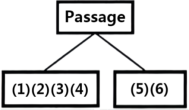 | B.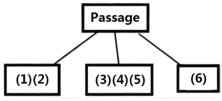 |
C. | D.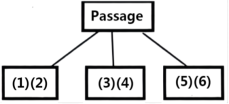 |
7 . When people learn to play video games, they are learning a new literacy. Of course, this is not the way the word “literacy” is normally used. Traditionally, people think of literacy as the ability to read and write. Why, then, should we think of literacy more broadly?
Nowadays, language is not the only important communication system. Images, graphs, diagrams and many other visual symbols are particularly significant. Thus, the idea of different types of “visual literacy” would seem to be an important one. For example, being able to read the images in advertising is one type of visual literacy.
Furthermore, very often today words and images of various sorts are juxtaposed in a variety of ways. In newspapers and magazines as well as in textbooks, images take up more and more of the space alongside words. In fact, in many modern high school and college textbooks, images not only take up more space, they now carry meanings that are independent of the words in the text. If you can’t read these images, you will not be able to understand their meanings from the words in the text as was more usual in the past.
Now there are different ways to read different types of texts. Literacy is multiple, then, in the sense that the legal literacy needed for reading law books is not the same as the literacy needed for reading physics texts or cartoon books. And we should not be too quick to dismiss the latter form of literacy. Many cartoon books are full of images that would make a modern literary critic’s heart beat fast and confuse any otherwise normal adult.
Once we see this multiplicity of literacy, we realize that when we think about reading and writing, we have to think beyond print. Reading and writing in any field, whether it is law, rap songs, academic essays or cartoon books, are not the only ways of decoding(解密) print. Video games are a new form of art. They will not replace books; they will sit beside them, interact with them, and change them and their role in society in various ways, as, indeed, they are already doing strongly with movies. We have no idea yet how people “read” video games, what meanings they make from them. Still less do we know how they will “read” them in the future.
1. What is the broad meaning of literacy?| A.The ability to read, write and view. |
| B.The ability to read, listen and play. |
| C.The ability to speak, write and think. |
| D.The ability to listen, speak and think. |
| A.Put together. | B.Pulled out. |
| C.Taken away. | D.Replaced with. |
| A.Proud. | B.Upset. |
| C.Grateful. | D.Curious. |
| A.are too violent to risk experimenting with for the purposes of understanding literacy |
| B.are unrealistic and should not fall into the same categories as the other texts he describes |
| C.are not yet entirely understood in terms of literacy, but are already impacting other forms of expression such as filmmaking |
| D.are irrelevant in academic discussion because no one has yet determined how to explain the ways that people understand them |
| A.A historical explanation of the very first video game and its evolution. |
| B.A technological definition of video games, how they are made, and how they are played. |
| C.Examples of the way that some people currently interpret video games and what they mean to them. |
| D.A price comparison of video game consoles and whether or not quality has a direct impact on literacy. |
| A.Education. | B.Health. |
| C.Advertisement. | D.Traveling. |
8 . That morning, I dropped our eldest at kindergarten and returned home to let our two younger children play while I worked on my medical report. It was wonderful, but it hit me that my career in hospital wasn't making a difference in anyone's life. I needed something that would stretch my limits and push me to grow. My career enabled me to work from home. I could work from home, and become a foster (领养) mother, providing safety for a child who needed it desperately.
On Monday morning, I picked up the phone and dialed the number I had googled for the nearest Department of Children's Services. The man on the other end was receptive to my questions and explained the next step of training, involving eight weeks of classes designed to prepare and educate foster parents. We continued through all the classes, the home visits, background checks, and seemingly endless steps.
Five long months after we were approved, the phone rang. In the middle of the night, I woke my husband and rushed to East Tennessee Children's' Hospital. Our placement was waiting for us in the emergency room, sick and lack of nutrition. It didn't take long for us to realize the full depth of her suffering. Six months later, her half-brother came to us by our request. We now had five children under our care.
On August 12, 2016, our family of seven walked into a small courtroom. The children's lawyer and social worker were there. With just a few words, our adoption was finalized. These two amazing children weren't going home, because they were already home. We are their forever family, and they are our forever children. We may not be able to change the entire world, but we have changed the world entirely for our new children.
1. How did the author feel about her hospital work?| A.Unusually demanding. | B.Lacking in motivation. |
| C.Filled with challenges. | D.Packed with chances. |
| A.She wanted to make a difference in other people. |
| B.She felt sympathetic for abused children she knew. |
| C.She felt confident about her ability to raise children. |
| D.She experienced training to raise children properly. |
| A.The foster parents must be healthy and well-educated. |
| B.It was impossible to go through all the endless process. |
| C.The man on the phone was nice and gave clear instructions. |
| D.The home visits and background checks would take eight weeks. |
| A.The child to be adopted. | B.The need to get trained. |
| C.The approval of adoption. | D.The official at the hospital. |
| A.To put the adopted kids elsewhere. | B.To receive another adopted child. |
| C.To begin the kids' adoption in her home. | D.To make the adoption officially legal. |
9 . A review from the International Programme on the State of the Ocean (IPSO) warns that the oceans are facing multiple threats. They are being heated by climate change, turning slowly less alkaline (碱性的) by absorbing CO2, and suffering from overfishing and pollution.
The report says, “We have been taking the ocean for granted. It has been shielding us from the worst effects of accelerating climate change by absorbing excess CO2 from the atmosphere.”
Although the temperature increases may be experiencing a pause, the ocean continues to warm regardless. For the most part, however, the public and policy makers are failing to recognize — or choosing to ignore — the severity of the situation. Coral reefs, for instance, are suffering from the higher temperatures.
IPSO, funded by charitable foundations, is publishing a set of five papers based on workshops in 2011 and 2012 in partnership with the International Union for Conservation of Nature. The reports call for governments all over the world to halt (暂停) CO2 increase at 450ppm, and also urge much more focused fisheries management and a priority list for tackling the key groups of chemicals that cause most harmful effects. They want the governments to negotiate a new agreement for the sustainable fishing in the high oceans to be monitored by a new global high seas enforcement agency.
The IUCN's Prof Dan Laffoley said, “What these latest reports make absolutely clear is that delaying action will increase costs in the future and lead to even greater, perhaps permanent losses. “The UN climate report confirmed that the ocean is bearing the pressure of human-induced changes to our planet. These discoveries give us not only more cause for alarm, but also a roadmap for action. We must use it.
1. According to the passage, _______ are NOT the reason why the oceans become slowly less alkaline.| A.various pollutions | B.higher temperatures |
| C.bad fishing practices | D.destroyed coral reefs |
| A.warning | B.protecting |
| C.showing | D.cooling |
| A.To appeal to world governments to halt CO2 increase at 450ppm. |
| B.To tell us that the ocean is bearing the pressure of human-induced changes to our planet. |
| C.To ask the governments to carry out new measures for the sustainable fishing in the high oceans. |
| D.To advise the governments to make a priority list for tackling the key groups of chemicals that cause most harm. |
| A.The reports warn us that we need to take actions right now. |
| B.Coral reefs are weakened by bad fishing practices and pollution. |
| C.The global temperature is increasing and the ocean continues to warm as well. |
| D.It seems that the policymakers are trying to ignore the severity of the ocean situation. |
| A.To tell us that the oceans become less alkaline. |
| B.To advise us to negotiate a new agreement for the sustainable fishing. |
| C.To tell us that global warming has a great effect on the oceans’ temperature. |
| D.To warn us that the oceans are in danger and immediate measures should be taken. |
10 . You can choose happiness regardless of your circumstances. You can choose to be happy no matter what challenges life brings you. Let the following simple strategies guide you back to your natural happy state.
Make lemonade when life gives you lemons.
Besides happiness, trouble will also be part of life. It’s how you choose to react to your situations that make the difference. If you look at something hard enough, you’ll see the positive side of it.
Do what you love doing.
Do you have a lifelong dream or desire? If so, start working towards it. Taking baby steps towards a goal will help you feel like you’re accomplishing something. You’ll find drive and determination to reach that goal when it’s something you love doing.
Use one of your talents.
One reason why so many people are unhappy is that they’re not doing what they’re called to do with their God-given talents. Each of us has a purpose in life. You have natural talents to help you achieve your purpose, so use your talents effectively.
Call a friend who you know is positive and cheerful.
Talk about your feelings and listen to their advice. Usually, people allow themselves to go deeper and deeper into self-depression. The truth is that you don’t have to be sad. You can decide to be happy. You just have to make up your mind to do so.
Gratitude is the quickest cure for sadness.
When you focus on what’s wrong with your life, you forget to look at what’s right and good. Take a step back and reflect on your life. Do you have children or family to be thankful for? Yes, they may not be the person we’d like them to be, but imagine life without them. Now, be thankful that you have them in your life.
Let your feelings out on paper.
Often you’ll find that just getting your feelings down on paper will allow you to work through them, helping you feel better about yourself and your beautiful life!
1. The first paragraph is used to _______.| A.expect readers to ignore themselves |
| B.start a discussion among readers |
| C.introduce the topic to readers |
| D.carry out a challenge among readers |
| A.trouble is part of life |
| B.lemonade is very delicious |
| C.life is full of sweetness and bitterness |
| D.lemons can only be used to make lemonade |
| A.diverse | B.natural |
| C.excellent | D.learned |
| A.Be grateful. | B.Do many activities. |
| C.Call a cheerful friend. | D.Use one of your talents. |
| A.excited | B.depressed |
| C.bad-tempered | D.kind-hearted |



